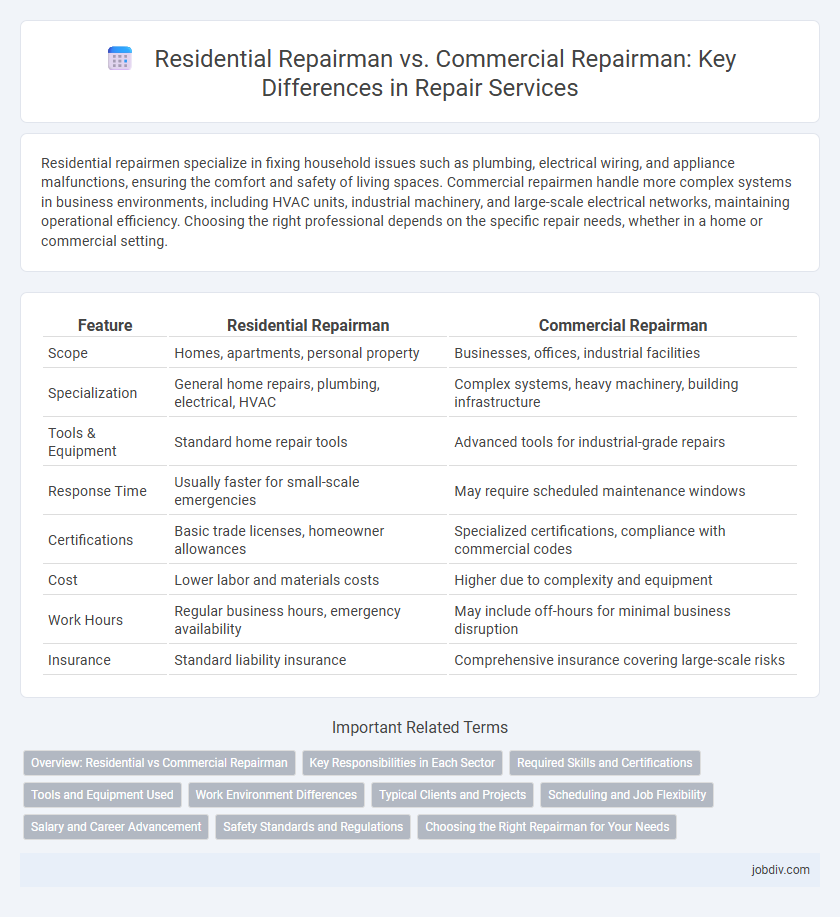Residential repairmen specialize in fixing household issues such as plumbing, electrical wiring, and appliance malfunctions, ensuring the comfort and safety of living spaces. Commercial repairmen handle more complex systems in business environments, including HVAC units, industrial machinery, and large-scale electrical networks, maintaining operational efficiency. Choosing the right professional depends on the specific repair needs, whether in a home or commercial setting.
Table of Comparison
| Feature | Residential Repairman | Commercial Repairman |
|---|---|---|
| Scope | Homes, apartments, personal property | Businesses, offices, industrial facilities |
| Specialization | General home repairs, plumbing, electrical, HVAC | Complex systems, heavy machinery, building infrastructure |
| Tools & Equipment | Standard home repair tools | Advanced tools for industrial-grade repairs |
| Response Time | Usually faster for small-scale emergencies | May require scheduled maintenance windows |
| Certifications | Basic trade licenses, homeowner allowances | Specialized certifications, compliance with commercial codes |
| Cost | Lower labor and materials costs | Higher due to complexity and equipment |
| Work Hours | Regular business hours, emergency availability | May include off-hours for minimal business disruption |
| Insurance | Standard liability insurance | Comprehensive insurance covering large-scale risks |
Overview: Residential vs Commercial Repairman
Residential repairmen specialize in fixing household issues such as plumbing, electrical, and HVAC systems, with a focus on individual homes or small residential buildings. Commercial repairmen handle larger-scale repairs in office buildings, retail spaces, and industrial facilities, often requiring knowledge of complex systems and adherence to commercial building codes. The key difference lies in the environment and scale of repairs, with commercial work demanding more technical expertise and regulatory compliance.
Key Responsibilities in Each Sector
Residential repairmen specialize in fixing household issues such as plumbing leaks, electrical faults, and HVAC system maintenance, ensuring safe and comfortable living environments. Commercial repairmen handle complex repairs in business settings, including industrial machinery maintenance, electrical system upgrades, and structural repairs to minimize downtime. Both roles require expertise in diagnosing problems and applying sector-specific solutions to maintain functionality and safety.
Required Skills and Certifications
Residential repairmen require skills in plumbing, electrical work, carpentry, and HVAC systems, often holding certifications such as EPA Section 608 for HVAC and state-specific licenses for electrical and plumbing. Commercial repairmen must have advanced technical expertise in large-scale mechanical, electrical, and structural systems, frequently needing OSHA safety certification and specialized credentials like the Certified Facility Manager (CFM). Both roles demand strong problem-solving abilities, adherence to safety regulations, and up-to-date certifications tailored to residential or commercial repair standards.
Tools and Equipment Used
Residential repairmen typically use versatile, handheld tools such as cordless drills, stud finders, and pipe wrenches designed for small-scale tasks in homes. Commercial repairmen require heavy-duty equipment like industrial-grade power tools, hydraulic lifts, and specialized diagnostic devices to handle larger systems and complex machinery in commercial buildings. The choice of tools reflects the scale and technical demands of residential versus commercial repair environments.
Work Environment Differences
Residential repairmen typically work in private homes, dealing with smaller-scale projects like plumbing, electrical, and HVAC repairs in living spaces. Commercial repairmen operate in business environments such as offices, factories, or retail stores, handling larger systems and equipment with stricter safety regulations and downtime constraints. The commercial setting often requires coordination with facility managers and adherence to specific business hours, whereas residential repair work offers more flexible scheduling.
Typical Clients and Projects
Residential repairmen typically serve homeowners and tenants, addressing projects such as plumbing fixes, electrical repairs, and HVAC maintenance within houses and apartments. Commercial repairmen focus on business clients, managing larger-scale tasks like industrial equipment servicing, office building maintenance, and complex electrical system troubleshooting. The scope of work for commercial projects often involves higher specifications and stricter compliance with safety regulations compared to residential repairs.
Scheduling and Job Flexibility
Residential repairmen often offer more flexible scheduling options to accommodate homeowners' availability, frequently providing evening or weekend appointments. Commercial repairmen typically adhere to stricter schedules aligned with business hours to minimize operational disruptions in commercial settings. The varying demands of residential versus commercial environments necessitate distinct approaches to job flexibility and appointment coordination.
Salary and Career Advancement
Residential repairmen typically earn average salaries ranging from $35,000 to $50,000 annually, with modest opportunities for career advancement through certifications and specialization. Commercial repairmen often command higher salaries, commonly between $50,000 and $70,000 per year, benefiting from larger projects and contractual work that foster faster progression into supervisory or managerial roles. Career growth in commercial repair is accelerated by acquiring technical expertise in complex systems and building strong client relationships.
Safety Standards and Regulations
Residential repairmen adhere to safety standards such as the National Electrical Code (NEC) and local building codes specific to residential properties, ensuring household systems are safe for occupants. Commercial repairmen must comply with more stringent regulations, including OSHA standards and NFPA codes, to manage the higher risks present in industrial or business environments. These differing regulatory frameworks influence the training, certification, and safety protocols each type of repairman follows to maintain compliance and protect property and personnel.
Choosing the Right Repairman for Your Needs
Choosing the right repairman depends on whether the project involves a residential or commercial property, as specialists in each area possess unique skills tailored to the complexity of the setting. Residential repairmen are experienced with home-specific systems and materials, while commercial repairmen handle larger scale infrastructures and compliance with business regulations. Evaluating the scope of work, expertise required, and budget constraints ensures hiring a repair professional who aligns with the specific demands of your property.
Residential Repairman vs Commercial Repairman Infographic

 jobdiv.com
jobdiv.com